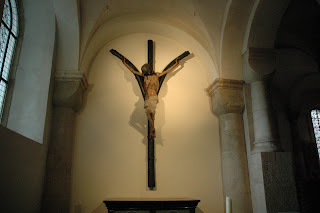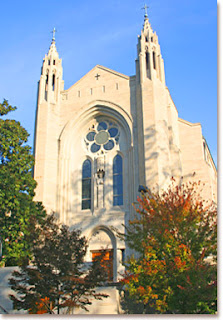Could Anglicanorum Coetibus Lead to Liturgical Renewal
Being raised an Episcopalian, I have always had a deep love of sacred liturgy and by sacred liturgy I mean that there is a real sense, by the community gathered, that one is in the presence of God during the Holy Eucharist. Since my conversion to the Catholic faith, I have joked with many of my Catholic friends that one could argue that the traditional Anglican service has more Catholic elements than the Mass celebrated in many Catholic churches in the United States.
So it has been a surprise that, since the publication of Anglicanorum Coetibus, there has been a lot a anticipation about allowing Anglican Use elements into mainstream Catholic Churches. Just this week, an article in the Wall Street Journal covered a story about Evensong being celebrated from the Book of Divine Worship (an Anglican Use liturgy approved by Rome) in, of all things, a Catholic Church that regularly celebrates the Tridentine Mass.
Is the attraction to this Liturgy, especially to traditional Catholics, due to the fact that it is not only in the vernacular but maintains a sense of the sacred? Could the foundation of Anglican Ordinates within dioceses around the United States lead to a renewal of that sense of the sacred within the Mass in those dioceses? This process will certainly be an interesting thing to observe over the next few years; especially with the introduction of the revised Missal, which is due out next year.
So it has been a surprise that, since the publication of Anglicanorum Coetibus, there has been a lot a anticipation about allowing Anglican Use elements into mainstream Catholic Churches. Just this week, an article in the Wall Street Journal covered a story about Evensong being celebrated from the Book of Divine Worship (an Anglican Use liturgy approved by Rome) in, of all things, a Catholic Church that regularly celebrates the Tridentine Mass.
Is the attraction to this Liturgy, especially to traditional Catholics, due to the fact that it is not only in the vernacular but maintains a sense of the sacred? Could the foundation of Anglican Ordinates within dioceses around the United States lead to a renewal of that sense of the sacred within the Mass in those dioceses? This process will certainly be an interesting thing to observe over the next few years; especially with the introduction of the revised Missal, which is due out next year.


The English have always been more successful at preserving traditions than Americans have; for they respect traditions, whereas we resist them. The tradition they have preserved in the Book of Common Prayer, as you and the article you cite note, is fundamentally Catholic. The gulf between the Church of England and the Catholic Church was only slight at the time of the Book’s composition. We find within the Book, as we find in many traditional “high church” practices, our English Catholic patrimony, diluted and profaned but a little bit with Protestant changes. The Vatican is now carefully removing those changes from the liturgy, and the beauty of this patrimony present in the Book will be restored when the work is completed.
ReplyDeleteI would not argue that the corrected Anglican use will “lead to a renewal” of the “sense of the sacred” in the mass; for I believe that this renewal has already begun in the Catholic Church. Permission for the more general use of the Tridentine mass is evidence of the renewal. I would argue, rather, that the Catholic renewal now underway has prepared the Church well for acceptance of the traditional Anglican liturgy. There is little doubt that this liturgy will only strengthen that renewal.
It is a fact, at least in modern times, that each age or generation over-reacts to the deficiencies of the preceding one and thereby produces its own, opposite deficiencies. This has also been the case recently in the Church. Many over-reacted in the decades immediately following the Second Vatican Council to the deficiencies they observed in the per-Vatican II Church. They, consequently, caused their own deficiencies, including in the area of liturgy. Much of Pope Benedict XVI’s work thus far in his pontificate has been to correct those deficiencies, a task for which, as the Holy Spirit knows, he is especially qualified. He is, at the same time, working to correct some of the deficiencies of an over-reaction of an even earlier generation, namely, that of the 1520s-1550s. Perhaps the corrections to the Common Prayer, along with the great invitation the Pope has made to our Anglican brothers, will finally help to bridge the gulf grown wider so that crossing the Tiber will be an easy, joyful, and even natural experience.